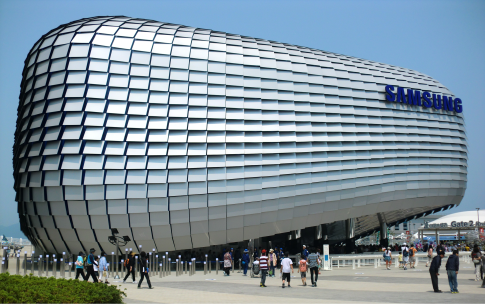Reverse Tipping and other Cultural Norms of Commerce in South Korea
I fell head over heels for a coffee shop a few blocks from my apartment called 304 Coffee - not in the least because it was the only place I could find that opened before 10:00 am. In addition to making excellent coffee, the shop's lower floor (the first of three stories, not uncommon for South Korean coffee shops) opened onto a patio overlooking a lake which was, itself, surrounded by a community garden.
By my third visit to the shop, I was recognized by the staff there. (Honestly, I was probably recognized each time as the foreigner desperately trying to adopt a Korean accent.) When the woman brought me my coffee, she had added a slice of delicious-looking tiramisu to my tray. She told me the tiramisu was 'for me, from them without cost' - in English, unfortunately, so I don't know how this would have been done in Korean.
The tiramisu was as delicious as it appears - an incredible combination of rich and airy. Well done, 304.
"Dum Culture" (pronounced "tah-um culture," but often written with a "d" when Romanized from Korean) is a type of "reverse tipping" common in South Korea. Shop owners will often present free items to customers, typically either on their first visit to the store or after the customer has become a regular, to show their appreciation for the patronage.
At other times I have been given a bottled drink from a convenience store or a piece of produce from a street vendor. I found the idea of business tipping customers rather than customers tipping a business's own employees both refreshing and humbling.
Gift giving is a foundational component of social and commercial life in South Korea, extending far beyond this custom. At all levels of business , partners and associates are expected to exchange gifts as a routine ritual of respect (typically with a structure of seniority determining who gives gifts to whom). Considering how regulated gift giving is in western corporate culture, I found these rituals quite interesting - particularly when you consider the depth of (intersection) between the government and business in South Korea.
The Chaebol
That intersection is most visible when looking into the country's chaebol system. South Korea's impressive economic rise has been widely credited to these chaebol (pronounced "jay-bowl"), which make up nearly two-thirds of the market share. The chaebol are conglomerates run by some of the country's wealthiest families and are heavily subsidized by the government. These are companies well known around the world, including Samsung, LG and Hyundai, as well as others prolific in South Korea but that have not (yet) become global names, such as Hanjin, Kumho, Lotte and SK Group.
Each chaebol does a lot more than a westerner might necessarily assume of any one corporation. Samsung, for example, is the largest such chaebol. While most famous in the West for its electronics, Samsung is also involved in construction (where such projects include the world's tallest skyscraper in Dubai), offering insurance and credit cards, managing small to medium sized cities, and maintaining a military unit.
[For more on just how big Samsung is: Infographic I Video ]

Samsung headquarters in Seoul. Source: Useful Stooges
In addition to smartphones and televisions, LG also makes chemicals and fertilizers... and owns Korean sports teams.

LG Science Park in Seoul. Source: Hok.com
Hyundai makes elevators, provides logistical services, and runs hotels and department stores, as well as producing Hyundai and Kia vehicles.

Hyundai headquarters in Seoul. Source: Hyundai Motor Group
Western Paradigms
Bloomberg recently produced a short video that provides a brief overview of the system.
The Bloomberg video leaves out a great deal of nuance about the system and, as such, provides a good example of how western media has failed to present a holistic view of South Korea's economic culture. The line between "gift" and "bribe," not to mention "cronyism" and "business," is in a different place in Korean culture than it is for many western countries built on a free market adversarial legal system. Failing to understand this nuance forces Korea into standards and expectations set externally from the phenomena playing out on the peninsula. Of course, western media does this all the time, from attributing Yemen's destruction to a balance of proxy warfare between Saudi Arabia and Iran, to failing to cover human rights abuses by allies while condemning those by antagonist countries.
This is not to say the media is attempting some sort of devious conspiracy but media outlets tend to fit global events into their own social and cultural paradigm, if only so they can be more easily digested by their viewers. (It is likely that this is - at least at times - how the journalists have taken in the information themselves. Everyone sees the world through their own lens - no agenda needed.)
In each case, failing to consider cultural context risks learning the wrong lessons and prescribing inefficient policy corrections. This is particularly important when considering South Korea because the country plays a pivotal role in world trade.
The Ties that Bind
South Korea's commercial culture, including an acceptance of dynastic wealth accumulation and significant government involvement in corporate success, is likely linked to the nation's deep collectivist roots. It is also reinforced by years of (outstanding) economic development attributed to this model. South Koreans are dedicated to developing their country. I would argue, and have heard others from North America and Europe argue, that it is already a developed country. I have yet to find a South Korean who agreed with this sentiment, however. "Almost" seems to be a common opinion. This mentality fuels their admirable hunger and drive for ever greater success.
Success that is not seen as a measure of wealth but as a measure of patriotism, of increased respect for their country, culture, and heritage on the world stage. In many ways, South Korea's development goals focus as much on spreading their soft power influence (K-pop, K-drama, etc.) as their exports.
Likewise, familial wealth has a greater connection to patriotism, as a marker of dedication to the national development, than to greed. Poverty, on the other hand, is largely associated less to individual failure or unequal structures of opportunity than to family disloyalty and irresponsibility. This is particularly the case when the poor individual is over the age of 50. Familial responsibility is another core component of South Korean culture, although this seems to be fading in recent years on the 'micro-level.' On the 'macro-level,' however, it is reflected in the continued conduction of business by the chaebol as a family affair, not to mention the election of former President Park in the first place, who was, herself, the daughter of General Park, who first empowered the chaebol system in the 1960s.
Putting Outrage into Perspective
It is difficult to consider the recent discontent with the chaebol without taking these cultural perspectives into account. While corruption among the echelons of government and business are well-known, the reaction in the public takes less the form of moral indignation common in the U.S and more closely resembles the indifferent acknowledgment common in countries like Colombia, where rule of law is less rigidly adhered to almost as a custom. Far from suggesting this is due to lower moral concerns in these countries, I believe a better explanation would be to describe it as differing moral concerns.
I think the core of the misrepresentation starts with the differing perceptions around the concepts of inequality and respect. From a western lens, South Korea's current circumstances would likely bring the outrage and resentment toward the wealthy that western media outlets have suggested. However, the South Koreans are (seem to be) more concerned with the embarrassment that the scandals have caused their country. More than their own personal struggles or financial insecurity, the South Koreans are concerned about the impression of their culture on the world stage. Loss of communal respect is a deeper blow than loss of personal wealth or opportunity.
President Moon's Talk of Reform
While the Moon administration has done a fair amount of talking about making changes to the chaebol system, this refrain has been used quite often in South Korea's political history. Typically, the chaebol figure out a way to make their form valuable in achieving an administration's goals while agreeing to moderate reforms that don't threaten their power. Then life goes on.
While many aspects of the culture in South Korea today do seem to be changing, these systems have deep roots in culture and history, making them unlikely to go anywhere fast. More importantly, the culture in East Asia is built on communal harmony as opposed to concern for a single idea of moral justice. This means that if the priorities of development and global respect can be reached through compromise, it is highly unlikely that the population will push for bold displays of individual responsibility. It will simply be unnecessary for achieving their goals. On the contrary, disrupting the system that has proven so successful could potentially disrupt their ultimate vision for their country.
Reconsidering the Western Lens
Although this may appear unjust in the western paradigm, it is worth noting that South Korea's economy was ranked number 1 in 2015 by the ICT Development Index and boasted it's fastest rate in seven years in 2017. South Korea ranked second only to Finland in education in 2012. It is concerning to consider how bored and increasingly depressed U.S. students could possibly compete with such a driven population in a global market.
That being said, how South Korea's market and government function is ultimately up to South Koreans - so it seems fair to also point out that suicide is the fourth leading cause of death in the country, second in the world and the highest in the OECD. Migration out of the country has also surged. It is possible that the resistance of the youth population will be stronger than I have given credit for here.
There is such a large Korean population on Steemit - I would love to hear your thoughts.
hola amigo steemins muy buen post te felicito espero que sigas asi https://steemit.com/@greenwich
muchas gracias mi amigo. :)